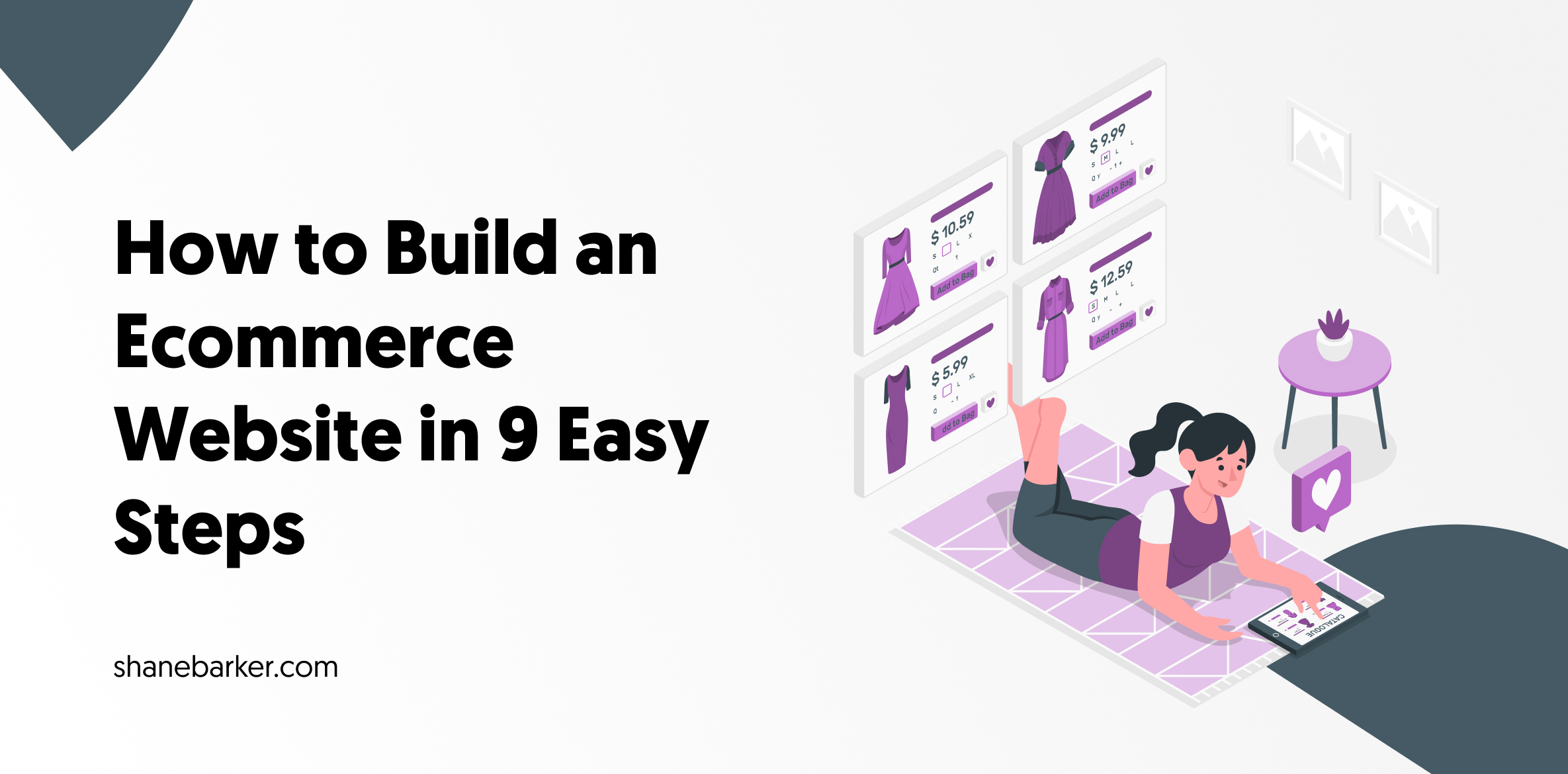Before we dive in, let’s make sure we know what ecommerce tools are, and why we need them.
What is an Ecommerce Tool?
Ecommerce tools are software created to help check, boost, and maintain your ecommerce website’s functionality. The best ecommerce tools are scalable as your customer base grows and they save time, so it’s not wasted on fixing smaller website issues. Apart from that, they also help improve the customer’s experience.
Important Features of Online Ecommerce Tools
Ecommerce tools should be all about design and functionality. Their purpose is to help you create an ecommerce shop that provides customers with the best online shopping experience possible.
Some of the most important features an ecommerce tool needs are:
Content Management
Content management tools are used to create and modify digital content.
This means that these tools are able to create, remove, and manage any content on a website, without the need to code it.
Content management tools relate to automated templates, page editing tools, workflow management, and document management.
Convenient Checkout
A checkout process can make or break your conversion rate. A checkout that is cluttered, difficult to read, or not functioning can and will cause you to lose valuable customers.
Most ecommerce tools and platforms will have checkout templates that should ease the pain of creating a custom checkout page, and run smoothly, so customers can purchase products to their heart’s content.
SEO-Friendly
Your website needs to have SEO-friendly code, so that search engines can understand what’s going on, on each page.
If Googlebot, Google’s web crawler, is unable to efficiently index your website, your ecommerce shop might end up ranked poorly.
This means your website won’t have much visibility and will struggle to make any sales.
Quick Report and Analysis Tools
Assessing and adapting are important parts of any business. And at the forefront of assessments is data.
Important things to look at when assessing your website are bounce rates, average order value, traffic source, time on site and page, as well as customer acquisition costs.
Ecommerce tools are able to provide you with valuable insights about your website. And it’s up to your brand to choose the most important KPIs and to check that the tool you’re investing in offers the relevant data you need.
Variety of Payment Options
Credit cards and debit cards are still in use, but with the ever-growing e-wallet market, as well as international customers, your store will need more than just one or two payment options.
According to FinancesOnline, 28% of consumers pay using e-wallets like PayPal and Stripe.
That’s almost a third of your potential customers. Surveys also showed that only 33% of millennials use cash, and only 18% of Gen-Z use cash.
What’s even more important is that 68% of Gen-Z customers prefer P2P payments, like PayPal, Venmo, and Stripe.
Having these options included at checkout satisfies a large percentage of your customer base, making it a crucial feature in any ecommerce tool.
How to Choose the Top Ecommerce Tools
Choosing the right ecommerce tool for your business is all about finding the correct features that suite your business management style, and what you need from the tool.
It’s also going to depend on your niche and target audience.
If you’re a small business owner or currently busy starting up your business, you’ll most likely want to get a free ecommerce tool, with decent support, some basic features, and the potential to scale with your brand.
Larger companies will be looking for more in-depth reporting and analysis features.
They’ll also need it to be able to manage a large, existing client base with focus on maintaining customers, as well as attaining more.
Now that we have an overall idea of what ecommerce tools are and why we use them, it’s time for me to show you the list of the 25 best ecommerce tools in 2024.
List of the 25 Best Ecommerce Tools
1. Shopify
Shopify is a beginner-friendly ecommerce tool. But don’t let that scare you away if you prefer something more robust.
Not only is Shopify easy to use, but it’s one of the best ecommerce tools on the market. And I highly recommend Shopify if you want to start an ecommerce store without much experience.
Shopify’s store creator is simple to use and requires no coding, only imagination.
![25 best ecommerce tools to grow your business in [year] 1 shopify 1](https://shanebarker.com/wp-content/uploads/2022/10/shopify-1.jpg)
Their premade themes look great as well, although some of the themes are behind a paywall.
![25 best ecommerce tools to grow your business in [year] 2 shopify themes](https://shanebarker.com/wp-content/uploads/2022/10/shopify-themes.jpg)
Key features
- A fully-hosted package that takes care of everything from backups to updates
- Drag-and-drop website builder
- Built-in marketing tools to run campaigns on Facebook and Google
- A single dashboard to manage everything from orders to shipping and payments
Pricing
- Basic Shopify: $29/month
- Shopify: $49/month
- Advanced Shopify: $299/month
- Shopify Plus: Pricing available on request
If you click here, you’ll get Shopify for $1/month for 3 months!
Pros
- Easy integration with loads of third-party payment gateways
- Sell everywhere, from your ecommerce store to online marketplaces and social media
- Excellent site performance
Cons
- More advanced features cost a lot
![25 best ecommerce tools to grow your business in [year] 3 shopify build your business](https://shanebarker.com/wp-content/uploads/2022/10/shopify-build-your-business.jpg)
Tool level
Independent business owners, high-volume merchants, large enterprises
Usability
Ecommerce, inventory management, marketing
Pro Tip: You can also hire a Shopify Expert to help you with everything from store setup to SEO.
Are you still confused about how to start your online business?
Here’s my 9-step guide to building your own ecommerce website.
2. BigCommerce
If we’re talking about the best ecommerce business tools, the list wouldn’t be complete without BigCommerce.
It is a powerful platform that offers endless opportunities to build, innovate, and grow your online store.
Their modern SaaS ecommerce platform has been designed to scale to any business, combining the best of SaaS and API openness, to allow you to create the website you want.
![25 best ecommerce tools to grow your business in [year] 4 bigcommerce 1](https://shanebarker.com/wp-content/uploads/2022/10/bigcommerce-1.jpg)
If you’re interested in their ecommerce platform, they have a 17-minute product tour, if you sign up with your email.
Key features
- Drag-and-drop design elements
- Flexibility to innovate with an open SaaS platform
- Easy integration with third-party apps
- Powerful analytics for valuable customer insights
- Best-in-class uptime and server response with Google Cloud Platform
- Storefront conversion features such as coupons, digital wallets, etc.
Pricing
- BigCommerce Enterprise pricing available on request
They offer a free trial right here if you’re interested.
Pros
- Easy to use
- Flexible, reliable, and secure platform
Cons
- You may find it expensive.
![25 best ecommerce tools to grow your business in [year] 5 bigcommerce product tour](https://shanebarker.com/wp-content/uploads/2022/10/bigcommerce-product-tour.jpg)
Tool level
From small businesses to enterprises
Usability
Ecommerce storePro Tip: If you are looking for an all-in-one ecommerce solution with tons of built-in features, BigCommerce is the right fit for you.
3. JungleScout
What makes Jungle Scout unique is that it’s the best ecommerce tool for those who want to start selling on Amazon.
From product research to product launch, it can help you build and grow your Amazon business from scratch.
They also offer a bootcamp for members who get the master bundle, which teachers you the ins and outs of ecommerce selling on Amazon.
There are still academy training courses for all subscription options, which include videos and ebooks to help your ecommerce journey.
Their YouTube channel is full of tips and tricks to use JungeScout to its full potential.
Their lowest tier only supports the tracking of 20 products, which sounds low, but for a small business owner, it’s a great way of cutting costs.
Key features
- Product research to identify high-demand products
- Keyword research to optimize product listings
- Analytics tool to track daily sales, revenue, and other key business metrics
- Targeted email campaigns to boost product sales
Pricing
- Basic: $29/month
- Suite: $49/month
- Professional: $84/month
Click here if you want an exclusive discount on JungleScout!
Pros
- User-friendly interface
- Extensive product data
- 100% free educational resources to get you started
Cons
- Some bugs in their web app integration and Chrome extension
![25 best ecommerce tools to grow your business in [year] 6 junglescout](https://shanebarker.com/wp-content/uploads/2022/10/junglescout.jpg)
Tool level
First-time sellers, existing Amazon sellers, brands, and agencies
Usability
Selling on Amazon, email marketing, inventory management
Pro Tip: You should use Jungle Scout’s Beginners’ Guide to make the best use of this ecommerce solution.
4. Shift4Shop
Shift4Shop is a complete ecommerce solution focused on ease of use and growth.
Their intuitive website builder comes with dozens of professional templates that are SEO and mobile friendly.
Their lowest plan includes unlimited products, an easy-to-use website builder that’s code free and has templates for almost any type of shop you can think of.
![25 best ecommerce tools to grow your business in [year] 7 shift4shop 1](https://shanebarker.com/wp-content/uploads/2022/10/shift4shop-1.jpg)
They also place heavy emphasis on being mobile friendly, with some important statistics.
Key features
- 100+ supported payment processors
- 200+ built-in features
- 50 free themes
- Cart abandonment recovery tools
- Full access to the HTML and CSS of your store for customization
Pricing
- Basic Store: $29/month
- Plus Store: $79/month
- Pro Store: $229/month
US merchants can create a free plan, right here.
Pros
- A complete, all-in-one hosted ecommerce solution
- SEO-friendly website builder
- VISA PCI certified security
Cons
- For advanced customizations, you need to have knowledge of HTML and CSS.
Tool level
From home-based startups to medium-sized businesses to large enterprise ecommerce sites
Usability
Ecommerce store, email marketing
Pro Tip: To unleash the full potential of 3dcart, learn from its extensive knowledge base, video tutorials, and support forum.
5. WooCommerce
WooCommerce is one of the best ecommerce tools that’s available for free.
It’s specifically built for those who want to add ecommerce functionality to their WordPress websites.
What makes WooCommerce very attractive is the fact that it’s easy to use and implement on your WordPress website.
They also have a hire-a-developer option if you’re running into trouble and need help that support might not be able to help with.
![25 best ecommerce tools to grow your business in [year] 8 woocommerce 1](https://shanebarker.com/wp-content/uploads/2022/10/woocommerce-1.jpg)
While they do require that you buy certain features if you want to upgrade the store experience, the free version works well enough too.
WooCommerce also has easy-to-set-up websites which they call no-code stores. These stores are premade stores that can be customized using blocks.
![25 best ecommerce tools to grow your business in [year] 9 woocommerce premade stores](https://shanebarker.com/wp-content/uploads/2022/10/woocommerce-premade-stores.jpg)
Key features
- Easy block-based page builder
- Extensive documentation and help with excellent customer support
- Excellent mobile apps for management on the go
- Flexible and secure payment options
Pricing
WooCommerce is completely free, and you can sign up right here.
Pros
- A complete, all-in-one hosted ecommerce solution
- Block builder is great for beginners
- Plenty of payment options for customers
- Completely free base version
Cons
- For advanced customizations, you need to have knowledge of HTML and CSS.
6. ProProfs Help Desk
It is common for ecommerce businesses to receive tons of emails asking about product features, delivery dates, product availability, and more.
This is where the ProProfs Help Desk comes into the picture and helps you respond to every customer email quickly.
ProProfs’ centralized point of contact service is excellent for businesses looking for an ecommerce tool that specializes in email management and automation.
Key features
- Track the progress of every customer request/issue
- Shared inbox for easy collaboration
- Built-in Knowledge Base and Live Chat
- Insightful reports to measure individual and team performance
- Capture customer feedback on ProProfs Help Desk with NPS, CSAT surveys
- Can work on desktops, mobile devices, and tablets
Pricing
- Essentials Plan: $10/user/month
- Premium Plan: $15/user/month
- Enterprise Plan: Contact their sales team
Click here to sign up now.
Pros
- Easy to set up
- Does not require expert training
- User-friendly interface
- Hosted in the Cloud
- Internal integrations like Knowledge Base, Live Chat, and Survey
Cons
- Lack of external integrations
![25 best ecommerce tools to grow your business in [year] 10 proprofs](https://shanebarker.com/wp-content/uploads/2022/10/proprofs.jpg)
Tool Level
Intermediate — Can be used by small businesses as well as multinational companies
Usability
Customer service, customer support
Pro Tip: Use internal notes and labels to keep tabs on issues and to route your tickets to the concerned departments easily.
7. UltraCart
This is the best ecommerce tool that lets you create your online storefront and start selling. It supports businesses regardless of the number of products and experience they have.
![25 best ecommerce tools to grow your business in [year] 11 ultracart](https://shanebarker.com/wp-content/uploads/2022/10/ultracart.jpg)
Their selection of free themes sets them apart from a lot of the competition. These themes are beautifully designed and quick to customize into your own website.
Editing pages are easy as well, with no coding knowledge required at all.
Key features
- Fully customizable themes to build a responsive website without any additional design skills
- Valuable insights from UltraCart's analytics dashboard to make informed marketing, sales, and design decisions
- Useful integrations with payment and fulfillment providers without expensive add-ons
Pricing
- Small: $49.95/month
- Medium: $79.95/month
- Large: $229.95/month
![25 best ecommerce tools to grow your business in [year] 12 ultracart 1](https://shanebarker.com/wp-content/uploads/2022/10/ultracart-1.jpg)
Tool level
For growing businesses, enterprises, and developers
Usability
Ecommerce, mobile commerce, website design
Pro Tip: It is best for those who want to add a store to their existing site. If you want to build a website from scratch, this may not be the best platform for you.
8. PrestaShop
PrestaShop is yet another free ecommerce tool that allows you to build your ecommerce website with ease.
What makes it one of the best tools for ecommerce is the fact that it can compete with Shopify and WooCommerce in terms of the features offered.
The only drawback of this tool is that it can be quite challenging to scale your store through it.
Key features
- Easy inventory management
- Easily export and import data through CSV files
- SEO-friendly
- Unlimited product listings
Pricing
PrestaShop is completely free to use.
9. Big Cartel
Big Cartel makes it simple for you to build your own store and run your business online.
It’s built especially for artists and creative individuals who want to sell their creations through their ecommerce stores.
It’s this personalized approach to designing the tool that makes it one of the best e-commerce business tools for you.
![25 best ecommerce tools to grow your business in [year] 13 big cartel](https://shanebarker.com/wp-content/uploads/2022/10/big-cartel.jpg)
Key features
- Informative real-time reports
- Theme code editing for unlimited customization
- Inventory tracking
- Sales tax autopilot
Pricing
- Free to use with 5 product listings
- $9.99/month for 50 product listings
- $19.99/month for 500 product listings
10. OpenCart
If you’re looking for a free ecommerce tool, OpenCart is the answer.
This is one of the best ecommerce tools that lets you operate your store without any charges.
It also comes with many free downloads and updates. If you want to upgrade your store’s functionality, you can download many paid extensions as well.
![25 best ecommerce tools to grow your business in [year] 14 opencart 1](https://shanebarker.com/wp-content/uploads/2022/10/opencart-1.jpg)
Key features
- 13000+ themes and modules to choose from
- Open-source means it’s transparent and completely free
- Excellent support team
- Fully integrable with 3rd party plugins
Pricing
OpenCart is free and open source. This makes it a great option for budding ecommerce businesses.
11. Adobe Commerce
Adobe Commerce, formerly Magento, helps you create unique ecommerce experiences for B2B and B2C businesses through their next-generation technology.
Adobe Commerce allows the management of multiple sales channels, as well as the management of those pages in 10 different languages.
You even get access to detailed analytics so that you can accordingly optimize your store as well.
![25 best ecommerce tools to grow your business in [year] 15 adobe commerce](https://shanebarker.com/wp-content/uploads/2022/10/adobe-commerce.jpg)
Key features
- Easily scales with your business
- Tailored promotions
- Automated data back-up
- Great support team
Pricing
For pricing contact Adobe’s sales team.
12. Volusion
From creating your store to selling products and growing your revenue, Volusion can help you achieve it all.
What makes Volusion one of the best tools for ecommerce is the fact that over 180k entrepreneurs trust it.
All you need to do is choose your themes and customize them to start selling.
![25 best ecommerce tools to grow your business in [year] 16 volusion 1](https://shanebarker.com/wp-content/uploads/2022/10/volusion-1.jpg)
Key features
- Fully customizable themes to build a responsive website without any additional design skills
- Create slideshows on your homepage easily
- In-house design service
- Built-in search function for customers on your website
Pricing
- Personal: $35/month
- Professional: $79/month
- Business $299/month
13. Ecwid
Ecwid is a freemium ecommerce tool that lets you create and manage a full-fledged ecommerce store with ease.
Their affordable fees make it one of the best business ecommerce tools. It offers unlimited storage and bandwidth. At the same time, you’re not charged any transaction fees.
![25 best ecommerce tools to grow your business in [year] 17 ecwid](https://shanebarker.com/wp-content/uploads/2022/10/Ecwid.jpg)
Key features
- Supports over 45 languages
- Easily automated marketing
- Automated tax calculations
- Native mobile app ecommerce shop creator
Pricing
- Venture: $12.50/month
- Business: $29.17/month
- Unlimited: $82.50/month
There is a free version available, with limited functions and support.
14. osCommerce
osCommerce is a great tool that lets you sell online with your self-hosted store and website for free.
With over 344k developers, store owners, and service providers, this is one of the best ecommerce tools.
To upgrade your store, they offer thousands of free add-ons as well. They have maintained a strong presence for the past 19 years, which only enhances their credibility.
![25 best ecommerce tools to grow your business in [year] 18 oscommerce](https://shanebarker.com/wp-content/uploads/2022/10/osCommerce.jpg)
Key features
- Zero payment processing fees
- Open source code
- Compatible with PHP and mySQL versions
- Fully customizable
Pricing
osCommerce is open source and completely free to use.
15. Zen Cart
This is an ecommerce tool that was developed with the sole purpose of making the whole process of running an ecommerce store easy.
It’s extremely simple to install the tool, and you can set up your store quickly with limited computer and coding skills.
Want to know the best part?
What makes it one of the best ecommerce tools is the fact that it can work with nearly every hosting company too.
![25 best ecommerce tools to grow your business in [year] 19 zen cart](https://shanebarker.com/wp-content/uploads/2022/10/Zen-Cart.jpg)
Key features
- Free open source
- Fully customizable
- Integrates with various payment gateways
- Works with all hosting companies
Pricing
Zen Cart is an open-source tool that is completely free to use.
16. CoreCommerce
CoreCommerce offers a fully-hosted, secure, and customizable ecommerce solution for all businesses.
What makes it one of the best ecommerce tools out there is that you can choose functions according to your requirements.
Be it a new store or an existing website that you want to turn into a store, this tool can do it all.
![25 best ecommerce tools to grow your business in [year] 20 corecommerce](https://shanebarker.com/wp-content/uploads/2022/10/CoreCommerce.jpg)
Key features
- Customized payment integration through CoreCommerce
- Automated accounting and tax
- Integrates with most popular processors
Pricing
- Basic: $29/month
- Pro: $79/month
- Business: $229/month
17. X-Cart
X-Cart lets you build your dream ecommerce store right from scratch.
It’s one of the best ecommerce tools for those businesses that have loads of stock-keeping units (SKUs).
What’s more, you ask?
They also offer a wide variety of themes that can make your website designing process smoother. This open-source tool lets you add extra features to it whenever you wish to do so as well.
![25 best ecommerce tools to grow your business in [year] 21 x cart](https://shanebarker.com/wp-content/uploads/2022/10/X-Cart.jpg)
Key features
- Custom integration and support for 3rd party plugins
- Custom feature development
- Catalog management
Pricing
- Platform: $199/month
- Auto: $299/month
- Marketplace: $399/month
For entry-level businesses, X-Cart is a great ecommerce tool that works for free.
18. CS-Cart
This is an ecommerce tool that powers over 35,000 stores and has been doing so for the past 14 years.
It offers a multi-vendor marketplace, which allows you to get significant attention from your customers too. Additionally, it boasts of over 500 features, some of which are built-in while the rest are add-ons.
Designing is also made simple with their easy-to-use layout manager that allows you to build responsive designs in seconds.
![25 best ecommerce tools to grow your business in [year] 22 cs cart](https://shanebarker.com/wp-content/uploads/2022/10/CS-Cart.jpg)
Key features
- Payment system with multiple payment options
- Order management system
- Scales easily with your brand
- SEO-friendly and optimized
Pricing
- Standard: $385 one-time payment
- Plus: $3500 one-time payment
- Ultimate: $7000 one-time payment
They also do custom packages if you contact their sales team.
19. VirtueMart
VirtueMart offers one of the best ecommerce tools for setting up an ecommerce store.
It includes over 500 unique features and brings in a strong network of worldwide online stores with it too.
Be it hosting or payment partners, they’ve got a huge list of them to ensure that your ecommerce store set up happens smoothly.
![25 best ecommerce tools to grow your business in [year] 23 virtuemart](https://shanebarker.com/wp-content/uploads/2022/10/VirtueMart.jpg)
Key features
- Completely free and open source
- Nested categories
- SEO-optimized
- Easily manage all your shoppers with shopper groups
Pricing
VirtueMart is yet another open-source tool that is completely free to use.
20. Ecomdash
Ecomdash is multichannel inventory management software that helps you sell your products with ease.
It comes with a host of features such as inventory sync, order management, etc. that can make your job of handling the store simpler.
(This makes it the best ecommerce tool out there.)
You can also automate drop-shipping and avoid the hassle of sending out sales orders manually along with fulfillment details.
![25 best ecommerce tools to grow your business in [year] 24 ecomdash](https://shanebarker.com/wp-content/uploads/2022/10/Ecomdash.jpg)
What makes this one of the best ecommerce tools is its numerous integrations.
You can integrate it with some of the most popular stores such as Amazon and eBay.
However, it also allows integrations with Shopify, WooCommerce, Etsy, BigCommerce, and more too.
Key features
- Drop-ship automation
- FBA management
- Multichannel listing
- Informative ecommerce reports
Pricing
Website Essentials: $4.95/month
Business Essentials: $7.95/month
Ecommerce Essentials: $13.95/month
Ecommerce Premium: $19.95/month
21. Omnisend
Omnisend is the best ecommerce tool built specifically for ecommerce businesses.
It empowers online sellers to communicate via multiple channels and leverage precise targeting.
Key Features
- Pre-built automation workflows
- SMS and push notifications
- Easy integration with over 30 ecommerce apps
Pricing
- Free plan
- Standard Plan: $16/month
- Pro Plan: $99/month
- Enterprise Plan: Custom pricing
You can get a 14-day free trial for their Standard and Pro plans. You don’t even need a credit card to get registered!
Pros
- Complete integration with ecommerce platforms
- Convenient segmentation features
- Actionable reports
- Great customer service
Cons
- Importing email templates requires basic knowledge of HTML and CSS
![25 best ecommerce tools to grow your business in [year] 25 omnisend](https://shanebarker.com/wp-content/uploads/2022/10/Omnisend.jpg)
Tool Level
- From small to medium-sized businesses
23. Ecommerce Templates
This is the best ecommerce tool that provides a shopping cart software solution that helps you host your online store with ease.
All you need to do is choose your preferred layout and develop your ecommerce website.
Alternatively, you can add the ecommerce functionality to your existing website and add your products to it.
![25 best ecommerce tools to grow your business in [year] 26 ecommerce templates](https://shanebarker.com/wp-content/uploads/2022/10/Ecommerce-Templates.jpg)
From store management and product features to shipping features and SEO-friendly features, this tool has got it all.
All designs are responsive, and you can integrate them with WordPress as well.
Pricing
There are loads of options to choose from when it comes to this ecommerce tool.
The ECT Hosted Store costs $24.95 per month.
On the other hand, the WordPress shopping cart costs only $130.
If you want to explore its full potential, you can opt for a Developer License that costs $219 as a one-time fee.
24. Coupler.io
Coupler.io is a data integration tool that will help you streamline the data management of your business.
In ecommerce, collecting data about your store is important to build a data-driven business, adjust growth and marketing strategy, and simply improve business data analytics and reporting.
To use Coupler.io, choose a needed connection, and your ecommerce data will be synchronized automatically between platforms or exported to one destination.
For instance, if you're using Shopify, connect Shopify to Google Sheets and export information about products, SKUs, orders, customer data, and other records.
25. Click-Up
Click-Up is the perfect productivity tool for busy, remote teams.
Click-Up allows you to create, schedule, and manage tasks with your remote team. Tasks are easily color coded, and sub-tasks allow you to oversee projects from start to finish.
There’s a built-in time tracker for individual participants and projects as well. It’s one of the best tools for ecommerce businesses that work remotely.
![25 best ecommerce tools to grow your business in [year] 27 click up](https://shanebarker.com/wp-content/uploads/2022/10/Click-Up.jpg)
Key Features
- Data export/import on a schedule
- Track time on tasks and people
- Color-coded tasks and projects
- Create sub-tasks to keep track of project progress
Pricing
- Unlimited: $5/month
- Business: $12/month
- Business Plus: $19/month
Comparison of the 10 Best Ecommerce Tools
| Name | Pricing | SEO-Friendly | Reporting Tools | Content Management | Support |
|---|---|---|---|---|---|
| Shopify | Starts at $29/month | Yes | Yes | Yes | Great |
| BigCommerce | Contact sales team | Yes | Yes | Yes | Great |
| JungleScout | Starts at $29/month | Yes | Yes | Yes | Excellent |
| Shift4Shop | Starts at $29/month | Yes | Yes | Yes | Great |
| WooCommerce | Free with paid add-ons | Yes | Yes | Yes | Good |
| ProProfs Help Desk | Starts at $10/month | Not applicable to this tool | Yes | Yes | Great |
| UltraCart | Starts at $49.95/month | Yes | Yes | Yes | Good |
| PrestaShop | Free | Yes | Yes | Yes | Great |
| Big Cartel | Starts at $10.99/month | Yes | Yes | Yes, but very | Average |
| OpenCart | Free | Yes | Yes | Yes | Good |
Ready to Grow Your Ecommerce Business?
The cut-throat competition in the ecommerce space has forced businesses to look beyond traditional methods of running their stores.
By designing attractive stores and managing them efficiently, you can catch the attention of your visitors and convert them into customers.
With the use of some of the best ecommerce tools, you can execute all of your store operations without any technical know-how as well.
What are some of the best ecommerce tools that you’ve come across? Let me know in the comments.







![top b2b ecommerce platforms for [year] 29 top b2b ecommerce platforms](https://shanebarker.com/wp-content/uploads/2022/04/Top-B2B-Ecommerce-Platforms.jpeg)

![11 best ecommerce platforms for small businesses in [year] 31 top 11 ecommerce platforms you can use for your small business](https://shanebarker.com/wp-content/uploads/2022/02/118-Top-11-Ecommerce-Platforms-You-Can-Use-for-Your-Small-Business.jpg)
![the world’s top ecommerce companies ([year] list) 32 the world’s top ecommerce companies [2022 list] (1)](https://shanebarker.com/wp-content/uploads/2022/06/The-Worlds-Top-Ecommerce-Companies-2022-List-1.png)
![25 best ecommerce tools to grow your business in [year] 33 25 best ecommerce tools to grow your business in 2022](https://shanebarker.com/wp-content/uploads/2021/11/Blog-Best-Ecommerce-Tools-to-Grow-Your-Business.jpeg)


I’m glad to find another amazing blogger.
Hi Disha, I’m glad you liked it.